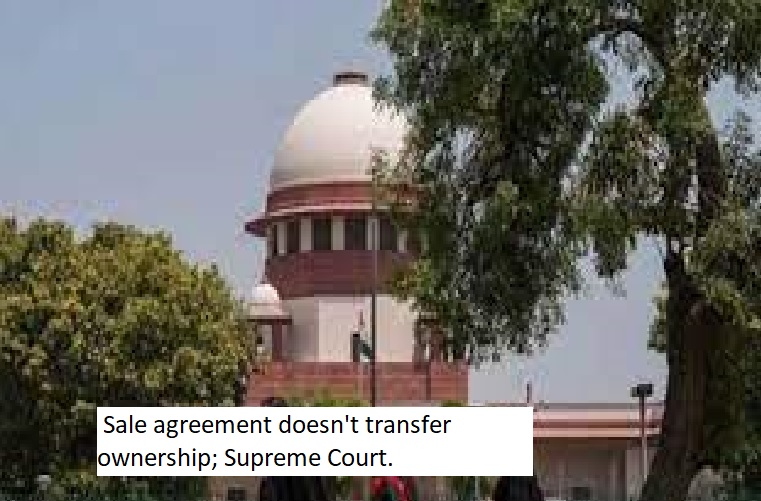


The Supreme Court has reiterated a crucial legal principle, emphasizing that an agreement to sell does not effectuate the transfer of ownership rights or confer any title. This reaffirmation came from a bench comprising Justices Vikram Nath and Rajesh Bindal. The court, in a civil appeal filed in 2011, dealt with a situation involving an agreement to sell executed in 1990. The anticipation was that the Karnataka Prevention of Fragmentation and Consolidation of Holdings Act, 1966 (Fragmentation Act), under which the sale agreement could be barred, would be repealed. This anticipation indeed materialized in 1991.
When faced with a refusal to execute the sale as per the agreement, the defendants took legal recourse by filing a suit for the specific performance of the contract. The trial court dismissed the suit, but the first appellate court allowed it. Subsequently, in the second appeal, the High Court reversed the judgment of the first appellate court and dismissed the suit, contending that the agreement fell within the purview of the Fragmentation Act.
The Supreme Court, in its examination of the case, underscored that the agreement to sell was not barred under the Fragmentation Act. It clarified that the act's prohibition, as outlined in Section 5, pertained to the lease, sale, conveyance, or transfer of rights. Since the agreement to sell does not create any rights on the land, the court held that it could not be deemed barred by the Act. Additionally, the court took note of the fact that the suit was filed after the repeal of the Fragmentation Act, ultimately allowing the appeal.
In providing legal context, the judgment referenced Section 54 of the Transfer of Property Act. This section explicitly states that a contract for sale, in and of itself, does not establish any interest in or charge on the property. Therefore, the court's decision aligns with established legal principles, reinforcing the notion that an agreement to sell is distinct from a conveyance or transfer of ownership.
This legal saga brings to the forefront the nuanced interplay between contractual agreements, statutory provisions, and the temporal aspect of legal enactments. The court's meticulous analysis of the Fragmentation Act and its application to the agreement to sell demonstrates a commitment to legal precision and a thorough understanding of the legislative landscape.
Furthermore, the case highlights the significance of timing in legal proceedings. The fact that the suit was filed post the repeal of the Fragmentation Act played a pivotal role in the court's decision. This temporal dimension underscores the dynamic nature of legal frameworks and the need for a contextual assessment of cases based on the prevailing laws at the time of adjudication.
In conclusion, the Supreme Court's pronouncement serves as a reaffirmation of fundamental legal principles surrounding agreements to sell and their distinction from conveyances or transfers of ownership. It also underscores the importance of a contextual and temporal analysis in legal interpretations, ensuring that justice is administered in alignment with the prevailing legal landscape.
TAGS: Supreme Court Agreement to sell Ownership rights Legal interpretation Temporal aspect Repeal